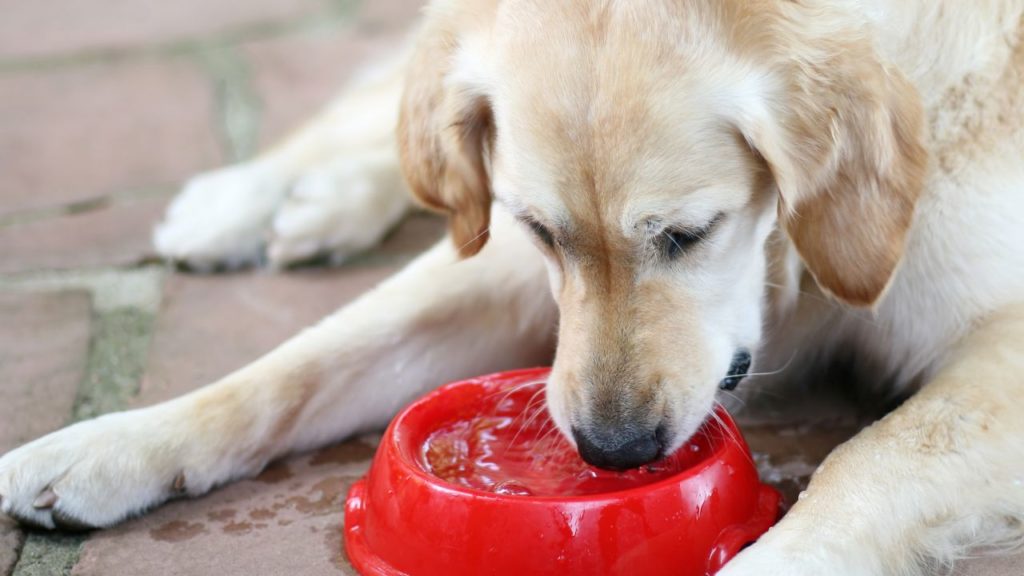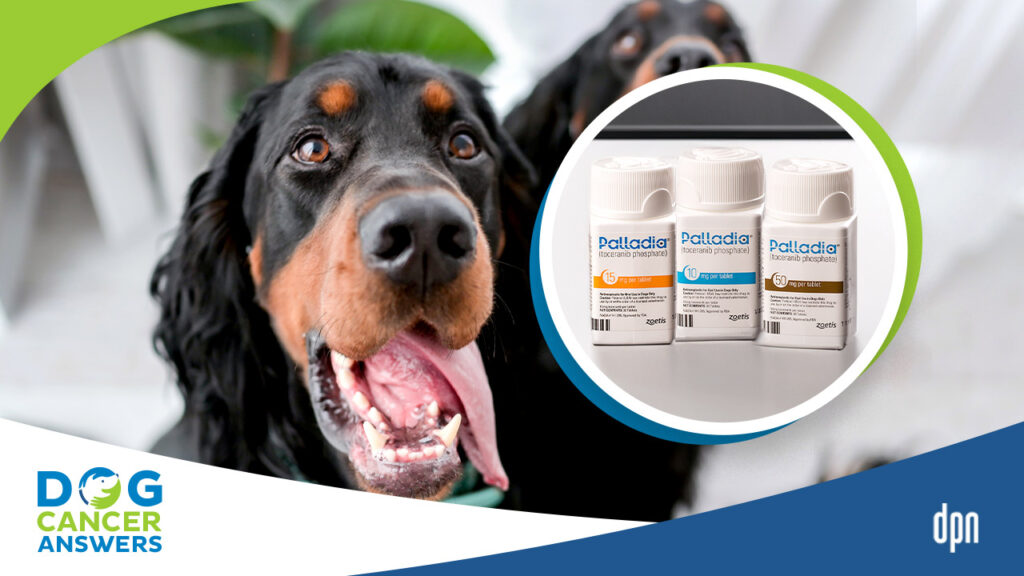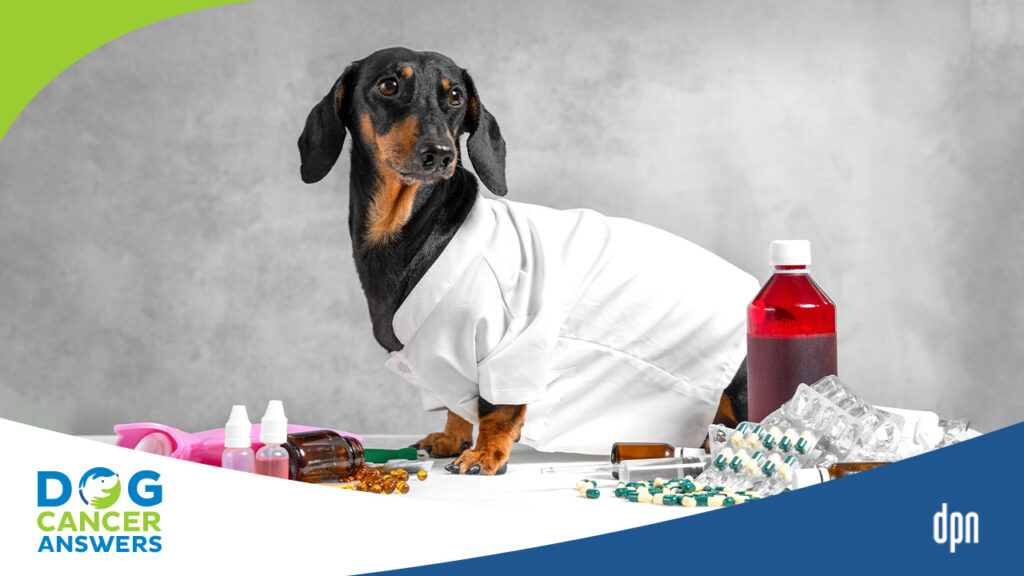EPISODE 152 | RELEASED January 31, 2022
What To Do With Leftover Dog Medications | Dr. Nancy Reese Deep Dive
If you have leftover dog medications, don’t flush them! Look for a local drug takeback program instead.
SHOW NOTES
If your dog has died or just doesn’t need a particular medication any more, you might find yourself with some extra pills. Keeping them around the house isn’t ideal due to risks to kids and pets, but what CAN you do with them?
Dr. Nancy Reese discusses why flushing leftover meds is not a good idea, and offers advice on finding a local drug takeback program or asking your veterinarian to dispose of more dangerous medications, such as oral chemotherapy drugs, for you. She also goes over the legal issues with donating medications, and the safety concerns of giving one pet’s medication to a different pet.
[00:00:00] >> James Jacobson: Today’s show is sponsored by The Dog Cancer Survival Guide, the best-selling book that helps you help your dog with cancer. Join the companion private support group at DogCancerSupport.com and get the email newsletter at DogCancerNews.com.
[00:00:19] >> Dr. Nancy Reese: The chemotherapy is certainly a big concern, ’cause those are, you know, don’t have just minor, uh, side effects or whatever if, if the drug goes out and an animal is able to ingest it from the environment. That’s certainly a big concern with the chemotherapies, but all the other drugs are not very particularly useful either. I mean, there’s antidepressants being found in water sources and things like that. It just, definitely don’t need to have all that secondary exposure.
[00:00:45] >> Announcer: Welcome to Dog Cancer Answers, where we help you help your dog with cancer. Here’s your host, James Jacobson.
[00:00:54] >> James Jacobson: Hello friend. Now I don’t know about you, but I have a couple of little bottles of dog medication that I no longer need but just don’t know what to do with. And to clear up that mystery, we are joined by our medical editor and practicing veterinarian Dr. Nancy Reese. Dr. Nancy also has a Master’s degree and a PhD. So when it comes to pets and medications, she knows her stuff. Dr. Nancy, thanks so much for being with us again today.
[00:01:25] >> Dr. Nancy Reese: Thank you so much for having me.
[00:01:27] >> James Jacobson: Today we’re gonna talk about leftovers and I don’t mean what’s leftover in the fridge after a big meal.
I’m talking about leftover medications after perhaps your dog dies or the course of treatment, you know, you, you got more than you needed and the, and the disease is gone. What should people do with those leftover medications that cost a lot of money?
[00:01:49] >> Dr. Nancy Reese: Well, I certainly like the second scenario better that the dog no longer needs the medication so you have some leftover, that’s always a better, better situation.
[00:01:58] >> James Jacobson: Those blue bottles, that means veterinarian basically, is that the difference so someone can determine those plastic pill, dispensing bottles, those are, is that the color that vets use?
[00:02:07] >> Dr. Nancy Reese: Actually the, their bottles will come in all different colors and there’s no specific. So we have pink, green, red, gold. I think those are the big ones, but yeah, I think it depends on what company you order from.
[00:02:20] >> James Jacobson: Okay. Okay. I thought there’d be, oh there’s a secret decoding ring! There isn’t. Okay. So, but what do you do with the leftovers regardless of, of why you no longer need them? What’s, what’s the best course to do?
[00:02:31] >> Dr. Nancy Reese: So that’s actually a, I’m glad you asked that question, in a way, because to me it starts to become even an environmental issue. In the past, I mean, they used to say, you know, open your bottle, pour it down the toilet and flush it. And we all thought great, that’s, you know, bye bye pills. Everything’s good. And then now they can find, I mean, traces of so many drugs in the water system and in the soil and things like that, that it just, just able to leach out.
So, um, certainly flushing is not the way to go.
[00:03:02] >> James Jacobson: It seems like such a primitive, you know, one day people did what? I mean, it’s like the old commercials where, you know, doctors were, were doing commercials for cigarettes. So the idea of like, just open it up and throw it down your toilet just seems so barbaric, but that had been the advice for a long time.
[00:03:18] >> Dr. Nancy Reese: Right, right.
And that, so certainly that is no longer recommended. Um, although I still hear people doing that anyhow, ’cause it, there’s not like a public information campaign to get out there saying don’t flush your drugs down the toilet, but maybe we should, maybe we should make one of those.
[00:03:34] >> James Jacobson: And people, especially like with oral chemotherapy products, that can be pretty bad.
[00:03:39] >> Dr. Nancy Reese: Right. The chemotherapy is certainly a big concern because those are, you know, don’t have just minor side effects or whatever if, if a drug goes out and an animal is able to ingest it from the environment, that’s certainly a big concern with the chemotherapies, but all the other drugs are not very particularly useful either.
I mean, there’s antidepressants being found in water sources and things like that. It just, definitely don’t need to have all that secondary exposure.
[00:04:04] >> James Jacobson: Okay. So what do you do?
[00:04:06] >> Dr. Nancy Reese: Probably the safest, best thing to do, um, most counties, at least, and even I’m in a pretty rural county, so if we have it I assume that everybody has it – there are a couple of times a year they will put, uh, some drug take back programs. So there are places that you can go – ours is often at one of the county administrative centers or outside the police department things – they will have bins outside and you can take your medication, human or animal or anything, and drop it off there.
And it’s monitored by law enforcement, at least around here. And that’s not to, they don’t check your name. They don’t check the drugs. They don’t do any screening. I think it’s just there so somebody doesn’t come along and try to steal the drugs.
[00:04:48] >> James Jacobson: Yeah. Ooh, what have we got in here?
[00:04:50] >> Dr. Nancy Reese: Yeah. Right. So, so I love those programs ’cause I will just save my expired or not used medications, I’ll put them in a big thing in a childproof container and away from, uh, anybody, with big Xs all over it so that everybody can see this is not to be taken and then take it to one of those drug take-back programs. So that’s the safest way, because they’re going to be disposed of in a manner that hopefully doesn’t start to get into our environment.
However, again, and I always refer to my rural county, because of the cost of medications and the likelihood that people have more than one animal, if somebody calls and say, "What do I do with this medication?" Depending on what it is, I will recommend that you hold onto it. Again, keep it in a childproof container away from, somewhere else.
But if it’s something like an anti-inflammatory where if your next dog gets hurt you might want to have something on hand. The biggest caveat to that is you need to call if you’re thinking of using that medication ’cause it may not be appropriate for that next animal because of its condition or another medication that it’s on or even the breed or species of the animal.
Those things are huge. But I will admit that we have people keep medications so that if they have an emergency and we can’t see them, and we know they have something that might tide them over until they can get in, we will give them an appropriate dose of that medication by phone.
[00:06:16] >> James Jacobson: And you just happen to have this on hand.
And what about the expiration date? ‘Cause sometimes, you know, there’s a pretty tight expiration date, at least with many of the veterinary drugs that I’ve seen that are, you know, redispensed by veterinarians, but they have a tighter expiration date. Would you even think of using a drug past its expiration date?
[00:06:34] >> Dr. Nancy Reese: Legally, you know, the expiration date it means, okay, get rid of it. You can’t use it anymore. Practically, I’ve used plenty of expired medications on myself and maybe even in my own pets, depending again, on the type of expiration date and also the condition that I’m thinking of treating. So there’s, some companies might put an automatic expiration date of three months from dispensing and it really doesn’t reflect the actual longevity of the medication. So there’s, you know, like some veterinarian programs could potentially just spit out a expiration date of one year from the date that it was prescribed.
[00:07:17] >> James Jacobson: And when you say programs, you mean like the software that’s used in the clinics-
[00:07:20] >> Dr. Nancy Reese: Yes.
[00:07:20] >> James Jacobson: -that they use to label that.
So even though, because a vet, you get a large unit of hundreds of pills and then you count out 30.
[00:07:28] >> Dr. Nancy Reese: Yes.
[00:07:29] >> James Jacobson: And then the program, the software that is used to label that may just say, oh, it expires in X number of days when in fact that’s not really what’s on the bigger container.
[00:07:38] >> Dr. Nancy Reese: Exactly. So it depends on the type of medication and what, even the form that it’s in, like a liquid medication likely may expire before a capsule or a pill, but it’s like some places have a policy that we’re going to put a one month expiration, regardless of when the pill actually goes bad. But yes.
And if I was treating something minor, if, you know, we’re thinking it’s a little injury that might need a non-steroid anti-inflammatory and then we’re not trying to talk about bone cancer or something that’s extremely painful, I might have somebody actually give an expired form that they have at home.
Again, if we know the right dose, the other medications the animal’s on, and we can’t get them a fresh supply anyhow. So it really depends on the condition that might be treated and other competing things with the animal. But yes, I, I, in all honesty, I’ve used expired drugs. I won’t prescribe an expired drug to a patient, but in my own household I’ve certainly used them.
[00:08:38] >> James Jacobson: Is there a, I mean, when one talks about drugs in general, they think of safety and efficacy. So expiration dates, does that mainly apply to the efficacy, in other words, it’s not, potentially not as effective, but it doesn’t increase the safety risks?
[00:08:53] >> Dr. Nancy Reese: The majority of it is efficacy so that the drug might not be as potent. But rarely it’s gonna be a safety issue.
[00:09:01] >> James Jacobson: Oh, it expired. And it’s going to kill you now.
[00:09:03] >> Dr. Nancy Reese: Exactly. Yeah.
[00:09:05] >> James Jacobson: Okay. In terms of like donating it to a vet clinic or a shelter, what are your thoughts?
[00:09:12] >> Dr. Nancy Reese: So that’s, that’s again a touchy subject, um, because there’s probably what is on the books as what is required to do versus what is humane and things.
So a shelter having some of these things on hand, uh, or, you know, for low-income things, again, especially with non expired drugs. But the biggest problem is that technically when something leaves a veterinary office, even in some cases if it isn’t opened, we can’t take it back because of the risk of some kind of tampering with the medication.
So that’s, and that’s really tough to have people say, you know what, I don’t want this anymore, or I used one pill and I don’t want it anymore. It makes it a really tough challenge because we have to tell them we legally can’t take that back. Um, but there, you may check with some of the organizations in your area as to what their policies are on that. We certainly had to get more strict with that. In quote "the old days," we used to take all sorts of medications back because we could reuse them for again, a, you know, a charity case or, you know, some of the shelter cases and things like that.
[00:10:16] >> James Jacobson: We’re gonna take a short break here, but we will be right back.
We are back with Dr. Nancy Reese, discussing what to do with leftover medications. Before the break, you mentioned a little bit about drug take-back programs and that they’re guarded by the police in your area. So how do you find out about those?
[00:10:38] >> Dr. Nancy Reese: That’s, that’s always an issue because in my area we will sometimes I’ll see either a little flyers posted somewhere or on some things like, um, social media sites, like, uh, Nextdoor, I don’t know if people have that, but there’s different neighborhood area things where they might post something like that, but it would be nicer if they had a more widespread announcement of that.
[00:10:59] >> James Jacobson: There’s no National Clearinghouse.
There’s an opportunity for someone to build a website, National Clearinghouse, where you can just type in your zip code or wherever you live and, and find out. So if you can’t get to or know about one of those take back programs and you do have some oral chemotherapy products and you no longer need them because you no longer need them, can you put them in the mail? What, what do you do? Because these seem like particularly difficult things to get rid of.
[00:11:27] >> Dr. Nancy Reese: Depending on where you got it from, most veterinarians should be able to take that back because we do have companies that will take our drugs and incinerate them or whatever it is they do with them.
But we do have special containers that we will put, particularly chemotherapy things in. So you put the whole vial, and if it’s like, if it’s an injectable product, we’ll put the whole syringe and all the tubing and all the gloves and everything in one of those special containers that then allow for proper disposal.
So you can get rid of those, you know, again, that’s definitely not the type of drugs we want out in the environment.
[00:12:01] >> James Jacobson: So most vets obviously have a way to dispense with biological waste.
[00:12:07] >> Dr. Nancy Reese: Yes.
[00:12:07] >> James Jacobson: And so, and these drugs would be considered part of that. So you could hopefully, I mean, you bought it from the vet, they should be able to take it back, at least dispose of it.
[00:12:14] >> Dr. Nancy Reese: Yeah.
[00:12:16] >> James Jacobson: Dr. Nancy, this has been very helpful. Thank you for being with us today.
[00:12:19] >> Dr. Nancy Reese: Well I hope I provided some information for people and hope they never need any of this advice.
[00:12:24] >> James Jacobson: And thank you listener for hitting that play button today. So the moral of the story with leftover medication is don’t flush them down the toilet, but instead look for drug take back programs in your area so that you can safely dispose of those meds.
You may also be able to dispose of some drugs like oral chemotherapy pills at your veterinarian’s office. And if you’ve hung on to some extra meds, always call your veterinarian before giving them to another pet just to be sure that they are safe to use and that you’re giving the correct dosage. To learn more about various cancer medications, visit our website at DogCancer.com. You can also subscribe to our newsletter at DogCancerNews.com. Dog Cancer News comes out three times a week. It’s a great newsletter and it has all kinds of information related to dog cancer. And it’s free! Just sign up at DogCancerNews.com. That is all for today. I’m James Jacobson and from all of us here at Dog Podcast Network, I’d like to wish you and your dog, a very warm Aloha.
[00:13:43] >> Announcer: Thank you for listening to Dog Cancer Answers. If you’d like to connect, please visit our website at DogCancerAnswers.com, or call our Listener Line at (808) 868-3200. And here’s a friendly reminder that you probably already know: this podcast is provided for informational and educational purposes only.
It’s not meant to take the place of the advice you receive from your dog’s veterinarian. Only veterinarians who examine your dog can give you veterinary advice or diagnose your dog’s medical condition. Your reliance on the information you hear on this podcast is solely at your own risk. If your dog has a specific health problem, contact your veterinarian.
Also, please keep in mind that veterinary information can change rapidly. Therefore, some information may be out of date. Dog Cancer Answers is a presentation of Maui Media in association with Dog Podcast Network.
Hosted By
SUBSCRIBE ON YOUR FAVORITE PLATFORM
Topics
Editor's Picks
CATEGORY








